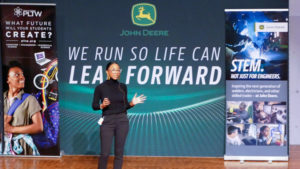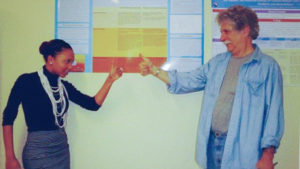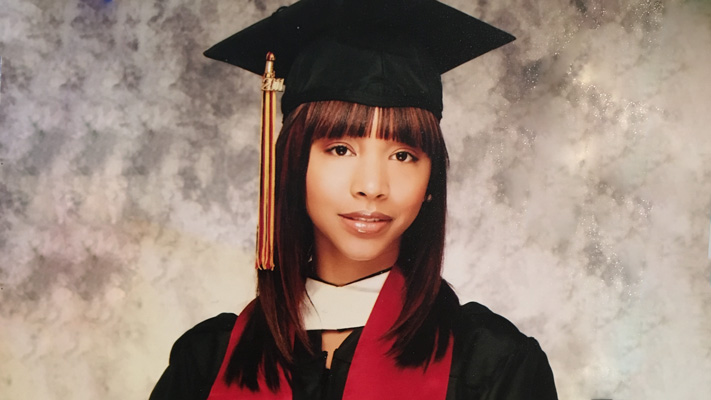CATEGORIES
Education and Life Skills | People We Admire | Social ImpactOverview:
- Brittany Brady’s parents instilled in her a sense of altruism and a desire to give back to her community.
- Brittany’s work at National Alliance for Partnerships in Equity (NAPE) focuses on driving systematic change to empower students, which coincides with what her father dedicated his career to.
- While progress has been achieved in providing equitable access to education for all, a lot still needs to be done.
- Remembering why we work in social impact is key to keeping us focused.
1. What was your childhood like and how did it shape who you are today?
My parents are ministers, and as a result, I grew up being in church for five days a week. For a kid, that is material because you’re always both outside of your house and sharing your parents with so many other people. It was an important formative memory for me to know that my parents were the trusted ones.
In late adolescence, I began to truly embrace my environment. My dad used to say the church is a hospital; everyone comes here to get something they need. So, don’t make any presumptions about why or how others show up. Just seeing people in that environment of care and community allowed me to remove the religious element from it and solely focus on the space. The people I saw who were most effective at connecting folks, leading ministry, and being engaging all had a teachable spirit and a willing heart. They wanted to show up in the community, and they were open to adapting and learning how to change programming to get better. I think that is what we really need to build a supportive community.
When my father retired, he was the CFO of a national nonprofit that provided workforce development for students who needed additional support. I’m now the CEO of a company that does exactly the same thing. It’s fascinating that not only our personalities but also our professional experiences have converged.
To watch my father ascend through his career, despite being a first-generation college student, was inspiring for me. It helped me understand the power of education, which includes learning from your community. There are certain things we ascribe value to as a society, but I think we need to have a broader stroke to deeply understand how many spaces there are for learning and progression as humans.

2. What initially started you on this journey?
The work at NAPE is so interesting because it’s systemic-level work. I have always been the “with the kids” kind of person. Sometimes you’re placed exactly where you’re meant to be and that’s how it feels at NAPE for me. I’m not directly interfacing with students. I’m dealing with state leaders, district leaders, teachers, and instructional coaches, but I would hope that those who are in systemic-level roles have proximity to students, so they can constantly be informed by their thinking.
My first job out of graduate school was in truancy prevention. I was at the second-largest middle school in Texas which taught 1800 students. When I had to investigate and better understand why kids weren’t coming to school, I saw all the barriers that exist in inviting every student to get the education they deserve. It showed me that it’s very easy for people to miss out on opportunities and it’s not their fault.
You should be able to still have schooling when you’re chronically ill. You shouldn’t have to wonder if you can get additional support because maybe you’re not reading as fast as others. Or maybe you have a learning difference and something is happening with you in the classroom, and instead of helping you, the teacher says, “I can’t deal with this today,” and so now you stop coming and no one even asks why.
I think that lens of seeing how quickly people can fall away underlines my work now in terms of equity. I don’t settle for let’s put a Band-Aid on a bullet wound, but rather believe in working for systematic change. Let’s make bold new decisions because clearly the way we now work doesn’t work for everyone.

3. What do you think is the most exciting part of your work and what is the most frustrating part?
I would say the possibility is most exciting. Being in this line of work reminds me that a lot is possible. It’s easy to get bogged down in daily life. However, it’s important to keep reminding yourself there is more on the other side because you see enough people striving for it.
The most frustrating part for me is the unknown. I remind myself that I don’t know what I don’t know and that’s frustrating because I can’t anticipate it. I’m a person who likes to anticipate what might be coming in, but it’s not easy in this space.
4. Have you had any mentors along the way and how would you say they have influenced you?
I’m grateful to have had many mentors along the way. Many have been informal but I had one formative mentor. I went to a STEM high school and had to do an internship in my senior year. There was a scientist at the National Institute of Health working in premier science. I asked him if he could help me find an internship. He would come and check on me in the lab I was in. He made sure I had a world-class experience doing science, something it’s rare to see in traditional classroom environments. For a year he would drive me to and from my internship. He would listen to a radio station and ask me questions to defend my position on different things. It was very gentle probing, but questioning myself and explaining my perspective really got me very far and I’m grateful to him.

5. How has equitable access to education changed since you first began working in this space?
Well, it hasn’t changed enough. I have worked in this field for 11 years, and some of the issues I saw in my early career, or even in my own educational experience, are persisting. I was on a call recently, and a colleague was talking about how AP students at their campus are pretty much all white and predominantly male. It’s 2023 and I would have expected there to be a little bit more balance by now. We have plenty of evidence that every individual comes with equal gifts or different gifts and we should be embracing them. I would like to see greater and more inclusive access to higher-level courses.
Another example is the issue of how standardized tests don’t always reflect people’s brilliance. Now, we’re seeing some universities do away with standardized testing as an admission standard, but it’s not as well-known or talked about.
However, in systemic change work, we see how much effort and time any change takes. We’re willing to do the day-by-day work that’s required to get there, but it’s definitely a labor of patience and love.
6. Could you share some key insights as an educator and advocate for equitable access to education?
The first lesson is to actually listen. Not listen to respond, but listen to understand. Working for social change is a field based on human connection. Education is a human-to-human interaction, so if you’re not listening to those you’re educating or in a relationship with, then you’re likely missing something.
The second lesson I learned is to be consistently graceful. When dealing with challenging personalities, it’s difficult to extend grace. But with a lot of diverse energies in the education space, specifically in STEM, we have to understand that people show up differently. This is similar to how my sister, who is a physician, engages with people differently. I can be at a funder’s place at one point in the day and then I can be with educators later on that day. So having the grace to understand others more has been a key learning.

7. What kind of impact do you hope to have in the near future?
In the next 5 years, I hope to broaden my impact. There’s just so much to be done. In my spare time, I’m on the board of a nonprofit called Building Opportunities and Opening Minds, which trains teachers from the community to stay in the community. I hope to do more work and activities like that to keep me proximal.
I also hope our organization is able to do work across America. Right now we are restricted in terms of geography and are at a starting point, but I want to keep talking about equity in every state
8. If you were to give us a piece of advice to keep going, what would you say to us?
Sometimes social impact work can feel heavy and busy. But the beautiful thing about working in social impact is that every effort you make advances a cause you said yes to and that you care about.
Additionally, I would say support one another. The people I knew early in my career are still the people I reach out to when something crazy happens at work. Offering friendship to one another is what has kept me in the social impact space. People who are drawn to the impact space usually have a certain level of intentionality, and sometimes you just need to be reminded of that.
Conclusion:
Brittany’s journey highlights the importance of persistence and believing in possibilities when it comes to influencing sustainable change. Believe in the why of what you are doing and keep working towards creating a better world.



